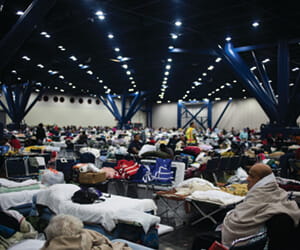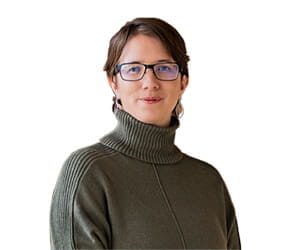
Amid the cots and concerns in a community shelter in August 2017, Dr. Amanda Robison-Chadwell ’17, ’11 had the chance to do what she’d spent a lifetime working toward. Surrounded by families and individuals displaced by Hurricane Harvey in Texas, the epidemiologist did her best to understand the diverse population around her while working to reduce the possibility of any of them falling ill.
Robison-Chadwell, currently the director of the Bell County Public Health District in Texas, traveled an unlikely but thoughtful path to do just that.
A self-proclaimed “military brat,” Robison-Chadwell grew up all over the world. Her introduction to public health education and disease reduction came from a teacher in Turkey when she lived there in her early teens. The teacher recommended a book called The Hot Zone, an account of the first emergence of the Ebola virus. She read it, and she was hooked.
“That book helped spark my interest in public health,” Robison-Chadwell says. “I’d always wanted to become an epidemiologist, but I also wanted to stand out.”

So, she made the somewhat unconventional decision to pursue her undergraduate degree in anthropology. “Most epidemiologists study biology, chemistry, or health science,” she says. “Because of my background, I recognized the importance of culture on public health. To be effective, I felt I needed to understand how to communicate cross-culturally.”
Robison-Chadwell knew she was onto something when the World Health Organization began to talk about social determinants of health in the early 2000s. But to pursue those dual passions, she also knew she’d have to validate that connection.
She earned her Master of Public Health (MPH) from Walden in 2011. “The MPH was a must-have to be an epidemiologist. I knew I was never going to get where I wanted to be without it,” she says. “After that, I thought that a PhD in Public Health would set me apart professionally, and it has. I was offered my current position largely because I was a PhD candidate when I applied.”
Robison-Chadwell’s experience with Walden was rewarding, she says, and both degrees have solidified the beliefs she’s had all along: Public health is starting to focus more widely on the lived environment as a health indicator. In her current position, she has used her degrees in a variety of public health situations, from travel vaccine warnings to foodborne outbreaks to cases of cholera.
“With my MPH, I was less aware of how practical the education really is at Walden,” Robison-Chadwell says. “But when I finally got to working in the field, I recognized the focus on practical public health education. That made taking what I learned in courses and applying it on the job such an easy transition.”
In other words, thanks to her background, her strategic focus, and Walden, she’s precisely where she has always wanted to be.



